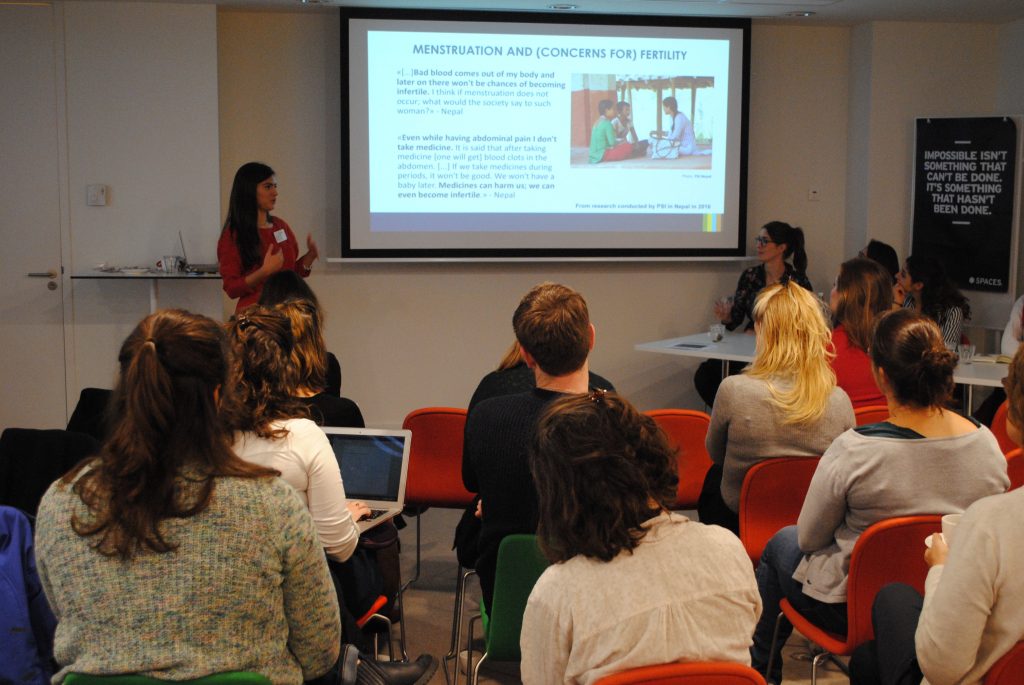Report – Making the Case for Menstrual Health: Why Periods Matter for Sexual and Reproductive Health
On November 27th, 2018, PSI-Europe organized, in collaboration with Share-Net International, a breakfast meeting under the title “Making the Case for Menstrual Health: Why Periods Matter for Sexual and Reproductive Health”. The group discussed about how menstrual health can help deliver better reproductive care through the life-cycle and how to make this work youth-friendly and appealing to mainstream audiences.
Odette Hekster, Deputy Managing Director of PSI-Europe, opened and closed the event on behalf of PSI-Europe. She explained how menstrual health is not simply a sanitation matter, but above all, a Sexual and Reproductive Health and Rights (SRHR) one, which needs to be integrated in programs and advocacy efforts.
Three presentations followed: Hilda Alberda, Director of Planning Monitoring and Evaluation (PMEL) at Simavi underlined the importance of evidence-base programming. Melodi Tamarzians, Youth Ambassador for Sexual and Reproductive Health and Rights (SRHR) for the Netherlands, highlighted how we need to have youth at the table when programming for menstrual health. Mariah Mansvelt Beck, co-founder and CEO of YONI, encouraged the group to choose appealing messages and visuals that can resonate with broader audiences and break the taboo.
A panel discussion followed the presentations, facilitated by Maria Carmen Punzi, Program Coordinator at PSI-Europe and Focal Point for Menstrual Health at PSI.
Dorine Thomissen, Senior Program Manager for SRHR at Simavi joined Melodi and Mariah at the panel. She reflected on the value of using menstrual health as entry point for broader SRHR topics, which she has observed in programs in Ghana and Indonesia.
Key Takeaways
- When we want to improve Reproductive Health, we miss out if we don’t address Menstrual Health: Reproductive health is not only about contraception and pregnancy (and abortion), it is about life-cycle care, from pre-menarche to post-menopause. We should look at all episodes of vaginal bleeding (and fluid) across the reproductive life-cycle.
- We should change the terminology: from menstrual hygiene to menstrual health. We should change the industry that, to a large extent (expect from some new players in the market), tends to look at menstrual hygiene management and overlook holistic women’s reproductive health needs.
- Menstrual health is often not part of the sexual and reproductive health agenda of young people. We can change this by bringing young people on board in defining this agenda and involving them in program design. Include young people and fund youth organizations.
- Focus time and money on translating our messages that resonate better with women (also with high quality visuals). Great examples from care.
- Involve men in the discussion and educate them while keeping a safe space for women.
- Dedicate more resources to research to fill the knowledge gap and, at the same time, better share and use of existing knowledge to build the evidence that menstrual health leads to better health (physical and mental) outcomes.
Relevant tools and resources
- “NORMAL Counseling Tool for Menstrual Bleeding Changes (job aid)” (PSI and partners)
- Rademacher KH, Sergison J, Glish L, et al. Menstrual bleeding changes are NORMAL: proposed counseling tool to address common reasons for non-use and discontinuation of contraception. Glob Health Sci Pract. 2018;6(3)603-610.
- Sommer M, Phillips-Howard PA, Mahon T, et al. Beyond menstrual hygiene: addressing vaginal bleeding throughout the life course in low and middle-income countries. BMJ Glob Health 2017;2:e000405. DOI: 10.1136/ bmjgh-2017-000405
- Siobán D. Harlow & Oona M.R. Campbell (2000) Menstrual dysfunction: A missed opportunity for improving reproductive health in developing countries, Reproductive Health Matters, 8:15, 142-147, DOI: 10.1016/S0968-8080(00)90016-8
- Menstrual Health Training Manual (Simavi)
- Menstrual Hygiene Webinar Series (Simavi and partners)
- The Cycle Story (YONI)
